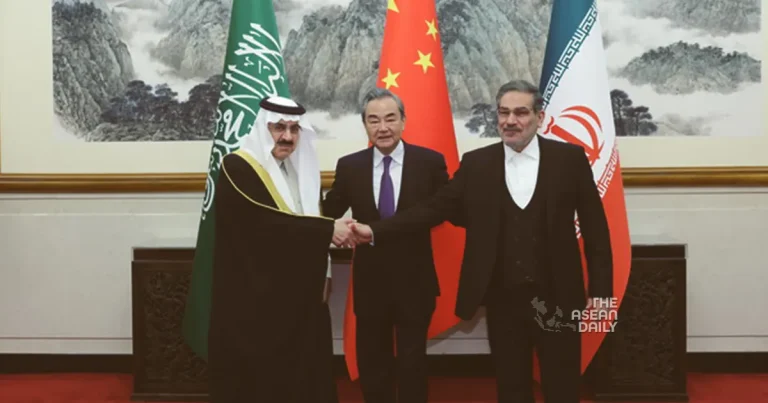15-4-2024 (BEIJING) Beijing has voiced deep concern over Iran’s retaliatory strikes against Israel on April 14th, but stopped short of condemning the attacks, describing them as a “spillover of the conflict in Gaza.” This measured response highlights China’s delicate balancing act as tensions escalate between its strategic partner Iran and Israel.
While nations like Japan, Denmark, Mexico and Singapore swiftly denounced the Iranian drone and missile attacks on Israeli territory – which Tehran claims were payback for an April 1st bombing of its consulate in Syria – China has refrained from criticising its crucial ally.
The two countries have forged close economic and strategic ties in recent years, with China purchasing a staggering 90 per cent of US-sanctioned Iranian crude oil in 2023 at discounted rates, making it Iran’s biggest trading partner.
Moreover, last year China brokered a landmark deal for Iran and Saudi Arabia to restore diplomatic relations after years of hostilities, underscoring Beijing’s growing influence in the Middle East.
Tellingly, China had earlier condemned Israel’s suspected strike on the Iranian consulate and urged the US to play a “constructive role” in resolving the Gaza conflict, but has remained silent on Tehran’s retaliation.
“The lack of a denunciation by Beijing shows it considers Iran’s actions a legitimate response,” said Ahmed Aboudouh, associate fellow at London’s Chatham House think-tank. “However, China is unlikely to take steps that may undermine relations with either Iran or Israel as long as its interests aren’t directly affected.”
Aboudouh, also head of China Studies at the Emirates Policy Centre in Abu Dhabi, added, “Beijing may seize this escalation to blame the US for not exerting enough pressure on Israel to stop the war in Gaza.”
Throughout the Gaza crisis, China has advocated for the Palestinian cause, emphasising a two-state solution as the only way to end the Israeli-Palestinian conflict. It has repeatedly called for a ceasefire but avoided condemning Hamas’ surprise October 7th attack on Israel.
“China has been publicly quite hands-off regarding Gaza. They’ve issued statements calling for peace, criticising Israel and expressing support for Palestine, but action has been less evident,” said Associate Professor Chong Ja Ian of the National University of Singapore, referring to China by its official acronym, the PRC.
Similarly in Yemen, Beijing has advocated for peace but not denounced the Iran-backed Houthi rebels’ attacks on commercial ships in the Red Sea since November.
“This reflects both the complicated situation facing Beijing and its limited leverage in the region,” Prof Chong said of China’s cautious approach.
Even so, the US and western allies had urged China to leverage its sway with Iran to prevent retaliatory strikes and an escalation after Tehran vowed vengeance over the consulate attack.
Yet Aboudouh believes “the US understands the limits of China’s leverage over Iran and Beijing’s lack of desire to support Washington’s strategic preferences towards the ongoing Iran-Israel conflict.”
He suggests the Biden administration “seeks to highlight China’s inaction and self-interested approach” to rally regional countries around the US as “the only security principal that guarantees regional stability.”
Prof Chong noted that broader Middle East instability could disrupt Chinese supply chains and energy imports, straining its economy – something Beijing aims to avoid by maintaining positive ties with Arab states and Iran.
“Beijing probably wants to avoid behaviour that could seem less supportive to these actors, including publicly criticising or pressuring Tehran,” he said. “How much Beijing can really restrain a partner like Iran is also unclear, especially on issues Tehran deems important.”
As a result, China is expected to stick to its risk-averse balancing policy while handling Iran and Israel relations, said Aboudouh.
“This aligns with Beijing’s concern that if the ‘spillover’ reaches the Gulf region, it may unravel the China-sponsored diplomatic thaw between Iran and Saudi Arabia,” he added, citing the risk of Israel striking Iranian interests in the vital Strait of Hormuz oil chokepoint, or US military strikes from Gulf bases prompting Iranian retaliation.
“I suspect this is the biggest concern for Chinese officials right now.”




